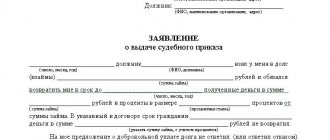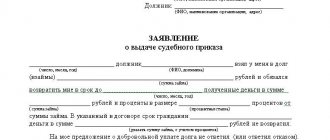Home /Articles on bankruptcy of individuals
Author of the article: Konstantin Milantiev
Last revised October 11, 2021
Reading time 10 minutes
Sometimes citizens find out that money has been collected from them by court order only from an SMS message from the bank about the amount being written off. Why is this happening? The fact is that in the writ procedure the judge does not hold meetings - he simply reviews the documents and makes a decision in just 5 days. Such a simplified penalty can be appealed. To return the money after cancellation, the defendant asks for a rotation of the court order.
The essence of the court order
A court order is a decision made by a single judge to recover money or to reclaim movable property at the request of the plaintiff. The cost of debt is up to five hundred thousand rubles.
The procedure is very simple.
The creditor submits an application for an order and evidence confirming the existence of the debt, and the court issues a certificate of satisfaction. Writ proceedings take place without summoning the parties, and strict procedural requirements are not imposed on the application. Banks, microcredit organizations, housing and communal services organizations and other creditors prefer this prompt way of debt collection rather than lengthy litigation proceedings.
A writ of execution is not needed in this case. A court order is a writ of execution that is sent to the bailiffs to initiate proceedings.
The debtor can file objections to the court order, but to do this he has only 10 days from the date when a copy of the order arrived by mail. If a person does not receive mail, he will learn about the court decision after the fact - when the order has entered into force. A record of the debt will appear on State Services, and the money will be written off from the card by order of the bailiff.
It happens that a citizen agrees with his duty. Then there is no need to appeal anything.
If the defendant is not satisfied with this state of affairs, he can challenge the collection and ask for a reversal of the court order in order to return the illegally collected money and remove the restrictions.
Canceling an order
The reversal of the court order is carried out after the cancellation of the decision on collection.
Objection to a court order - 16.7 KB
For instructions on how to submit objections to cancel an act, read here.
Article 128 of the Code of Civil Procedure of the Russian Federation obliges a copy of the order to be sent to the debtor within five days. But it happens that for a number of reasons (poor postal service, change of place of residence, damage to the mailbox, etc.) the document does not reach the addressee. The law gives only ten days to appeal the act.
If the defendant did not receive the mail, he missed the ten-day deadline and the order became effective. Then the citizen will learn about the act issued when his money is written off, his property is seized, or he is prohibited from traveling abroad.
What to do if the defendant did not find out about the court in a timely manner and missed the procedural deadline for appeal?
An order that has entered into legal force can be appealed, even when it has actually been executed. To do this, objections to the order and a petition to restore the missed deadline are submitted to the judge who issued the order.
Sample petition to restore the deadline for filing objections to cancel a court order - 14 KB
You can restore the missed deadline by indicating a valid reason for not receiving the document and providing supporting materials.
The Plenum of the Supreme Court in paragraph 30 indicates that a citizen, legal entity or individual entrepreneur is responsible for their failure to receive a copy of the court order for an unexcused reason.
To justify missing a procedural deadline, provide evidence of the physical impossibility of obtaining a copy of the act on time:
- copies of travel documents;
- certificate of being on sick leave in a hospital;
- incorrectly filled in debtor's address;
- changing of the living place;
- act on the absence of a mailbox or its damage.
Due to the epidemiological situation, a precedent arose when the debtor was unable to obtain a decision due to being in quarantine, and the court agrees with these arguments.
The documents are submitted to the magistrate court that issued the order. You can find out the document number and the judge at the bank through which the money was written off, or at the bailiff service.
A simple option: look at the order number on the website in the FSSP database and call the court to find out the details. You can obtain a copy of the act by writing a petition for its issuance.
The debtor submits an objection to the court order. In objections it is not necessary to explain the reasons or prove the unlawfulness of the collection. It is enough to express your objection and ask to cancel the contested act - in civil proceedings, in accordance with Article 129 of the Code of Civil Procedure of the Russian Federation, such grounds are enough for the court.
Advantages of canceling a court order for the debtor:
- You can return written-off funds;
- Prohibitions and restrictive measures on property are lifted;
- The issue of debt collection will be resolved through litigation, which will provide an opportunity to participate in meetings and challenge the fact of the debt, its amount, fines and penalties imposed;
- If the limitation period is missed, debt collection becomes impossible.
How to cancel a court order on a loanRelated article
You can receive a ruling to cancel the contested act either in person at the office or by mail to the debtor’s address.
If, according to the order, the bailiff is conducting enforcement proceedings, then to terminate it it is necessary to contact the FSSP with a statement, to which attach a certified copy of the judge’s ruling to cancel the previously issued court order. In the case of credit debt, a copy of the determination should be provided to the executing bank with an application to terminate collection.
Suspension of the execution of a judicial act that has entered into legal force: subtleties and nuances
There is a saying that winners are not judged. But we lawyers know that this is not entirely true. They judge: after all, there is an appeal and cassation :)
What to do when judicial decisions by the courts of first and appellate instances are not made in your favor, but you decide to challenge them in the cassation instance and want to prevent the enforcement of the court decision? Let me make a reservation right away that this article will talk about monetary demands.
According to Article 283 of the Arbitration Procedural Code of the Russian Federation (hereinafter referred to as the Arbitration Procedure Code of the Russian Federation), the cassation court has the right, at the request of persons participating in the case, to suspend the execution of judicial acts adopted by the arbitration court of the first and appellate instances, provided that the applicant has substantiated the impossibility or difficulty of the turn execution or provided the security provided for in Part 2 of this article.
That is, the law provides a potential debtor with two options :
1. Justify the impossibility or difficulty of reversing the execution of the court decision. The burden of proving the impossibility or difficulty of reversing the execution of judicial acts lies with the applicant of the petition. Essentially, it all comes down to proving the unstable financial situation of the claimant.
This is evidenced by judicial practice, in particular in the Ruling of the Arbitration Court of the Moscow District on accepting a cassation appeal for proceedings and on suspending the execution of the judicial act dated March 25, 2019 (Case No. A40-119187/2018) it is stated: “The evidence presented confirms the applicant’s argument about difficult reversal of the execution of a judicial act, taking into account the presented evidence of the property status of the claimant. The suspension of the execution of judicial acts until the cassation court makes a decision on the case will be aimed at ensuring a balance of interests of the parties.” The ruling of the Arbitration Court of the Moscow District on accepting a cassation appeal for proceedings and on suspending the execution of the judicial act dated March 20, 2019 (case No. A40-66330/2018) also indicates the position of the court, according to which: “The evidence presented confirms the applicant’s argument about the difficult turn execution of a judicial act, taking into account the presented evidence of the property status of the claimant. The suspension of the execution of judicial acts until the cassation court makes a decision on the case will be aimed at ensuring a balance of interests of the parties.”
So, what arguments are advisable to use to prove the unstable financial position of a potential creditor:
- The cost of the claim is a fairly large sum of money. It must be compared with the income of the opposing company. The unfavorable financial position of the opponent can be evidenced by a profit and loss statement, which indicates the negative economic result of the company’s activities, low indicators of the company’s income, a negative value of the total financial result in the reporting period (Determination of the Federal Antimonopoly Service of the North-Western District dated 06/03/2013 in case No. A56 -46946/2012; Determination of the Federal Antimonopoly Service of the Volga District dated May 20, 2013 in case No. A12-10450/2012; Resolution of the Arbitration Court of the Ural District dated June 20, 2017 No. F09-1923/17 in case No. A60-40857/2016).
- The small amount of the company’s authorized capital, which will clearly not be enough to ensure satisfaction of the requirements (Determination of the Federal Antimonopoly Service of the North-Western District dated December 11, 2012 in case No. A56-61270/2011).
- Information that the company does not own property or the value of the property it owns will not be able to cover the amount of debt to be collected.
- The fact that your opponent's bank accounts have been repeatedly blocked.
- The presence in the proceedings of the Arbitration Court of your and other regions of cases involving a claim against a potential creditor with a high price (especially cases in which the decision has already entered into legal force). In this case, the application must indicate that such large sums of money will certainly be collected in the near future, which will also negatively affect the financial position of the company and make it impossible to reverse the execution of judicial acts.
- The presence of a large number of enforcement proceedings against the potential collector, in which he acts as a debtor, and the amount of claims is impressive.
- The unreliability of the opponent may also be indicated by the fact that at the time of the proceedings the company is in the process of reorganization.
- The presence of a small number of employees on the opposing company's staff. Often, companies have only 1 (one) employee officially listed. This argument also needs to be made.
- The risk also arises when the founder of your opponent is a foreign company, as well as when your opponent is itself a foreign legal entity (determined by the Federal Antimonopoly Service of the East Siberian District dated November 11, 2013 in case No. A33-8497/2012).
- Frequent changes in the leadership of the opposing company are also a factor of unreliability. If in a relatively short period of time (for example, 1 year - 1.5 years) the general director has changed 4 (four) times, then there is reason to think about the integrity of the potential creditor.
- To what extent does the manager appointed at the time of the dispute correspond to his position in terms of his education, age, and field of activity? There are obvious situations when, for example, the general director of a company is at a young age, and at the same time is the director and (or) founder of another legal entity, the main activity of which is significantly different in content from the activity of a potential recoverer. It is therefore questionable how a given person can actually manage organizations carrying out such different types of economic activities.
- It is worth checking whether the head of the opposing company was the head of other business entities and what their fate was. If these companies were subsequently excluded as non-operating or had other unfavorable economic fate, then these facts indicate that the director (general director) of the potential claimant is a nominee who is entrusted with the functions of the sole executive body.
The arguments should not be of a presumptive nature , since this particular deficiency is the most common reason for refusing to satisfy a petition. All the facts you provide must be confirmed by financial and economic documents, data from relevant registers, card files, data banks, as well as information from specialized (and often paid) reference systems.
Sometimes experts use information published in the media, but I believe that it can only be used if, in addition to the publication itself, it is confirmed by official economic documents.
Of course, if we take into account that when applying this legal institution it is necessary to maintain a balance of interests of the potential claimant and the potential debtor, then it seems quite logical to use additional arguments , namely:
- It is necessary to draw the court's attention to the fact that there are no negative consequences for a potential creditor in the event of suspension of the execution of judicial acts. Since the period of suspension will be insignificant in time (until the end of the proceedings in the cassation court). A similar position is presented in judicial practice, in particular, in the Determination of the Federal Antimonopoly Service of the North-Western District dated 04/07/2014 in case No. A56-43610/2013: “The cassation instance also takes into account that the measures taken are temporary in nature and are subject to cancellation after consideration of the cassation complaint on the merits, scheduled for 04/17/2014.”
- It is advisable to illustrate that if measures are not taken to suspend the execution of a court decision, significant damage will be caused to the interests of the debtor. In this case, the field of activity of your company matters. Such an argument can be accepted when a corresponding petition is submitted by an organization implementing significant social projects, which is executing a large municipal or state contract, etc. (Determination of the Federal Antimonopoly Service of the Volga-Vyatka District dated January 31, 2012 in case No. A82-2839/2011)
- It is worth noting in the case when the amount of collection is really large that for the applicant (potential debtor) these funds are working capital used to carry out current business activities and are necessary to fulfill current financial obligations to other counterparties (including loan obligations).
I would like to draw your attention, however, to the fact that these arguments should really only be of an additional nature. The court will take them into account, but only in conjunction with a well-founded statement about the instability of the financial situation of the claimant.
2. A potential debtor has the right, in order to suspend the execution of a judicial act(s), to provide security provided for in Part 2 of Art. 283 Arbitration Procedure Code of the Russian Federation.
The law provides that the execution of a decision or resolution of an arbitration court is suspended by the arbitration court of cassation if the person applying for such suspension provides compensation to the other party in the case for possible losses (countersecurity). This is done by depositing funds in the amount of the disputed amount into the deposit account of the arbitration court of the cassation instance or by providing a bank guarantee, surety or other financial security for the same amount (Judicial practice: Determination of the Federal Antimonopoly Service of the North-Western District dated September 20, 2013 in case No. A56- 48678/2012; Determination of the FAS of the North-Western District dated 03/06/2013 in case No. A56-42204/2012; Determination of the FAS of the North-Western District dated 10/24/2012 in case No. A52-1629/2012).
When using such a legal instrument as suspension of execution of a judicial act, you must also keep in mind the following procedural points :
- The courts consider the suspension of the execution of the appealed judicial act as an expedited remedy, the application of which does not require the presentation of evidence in the amount necessary to substantiate the claims and objections of the party on the merits of the dispute (Resolution of the Arbitration Court of the Moscow District dated April 23, 2019 in case No. A40- 102912/17, Resolution of the Arbitration Court of the Moscow District dated 04/25/2019 in case No. A40-202708/2015, Resolution of the Arbitration Court of the Moscow District dated 02/18/2019 in case No. A41-54536/2017, etc.).
- According to paragraph 29 of the Resolution of the Plenum of the Supreme Arbitration Court of the Russian Federation dated July 11, 2014 No. 46 “On the application of legislation on state duty when considering cases in arbitration courts,” the current legislation does not provide for the obligation to pay state duty when filing petitions to suspend the execution of the appealed judicial act (Article 265.1, 283, 298 Arbitration Procedure Code of the Russian Federation).
- The arbitration court of cassation shall issue a ruling on suspension of execution of a judicial act or refusal to suspend execution within three days from the date of receipt of the petition by the court.
- A petition to suspend the execution of a judicial act can be submitted to the court not only on paper (as was previously - see paragraph 7, paragraph 2 of the Resolution of the Plenum of the Supreme Arbitration Court of the Russian Federation dated February 17, 2011 No. 12), but also submitted in electronic form, however it must be signed with an enhanced qualified electronic signature.
It cannot be said that courts often use this legal instrument in practice, but practice does not stand still. And each new case provides an opportunity to form an independent precedent. As the Arbitration Court of the Moscow District noted in its Resolution No. F05-1948/2018 dated March 29, 2018 in case No. A40-42063/2017: “At the same time, the assessment of the justification for the impossibility or difficulty of reversing the execution of a judicial act by the Arbitration Procedure Code of the Russian Federation is at the discretion of the court. In each specific case, the cassation instance decides on the suspension of the execution of a judicial act, taking into account the balance of interests of the parties, based on the nature of the dispute and the possible negative consequences of the execution of judicial acts before checking their legality in cassation procedure.”
How to achieve a solution rotation
A court ruling to cancel a court order does not automatically return the money written off. If the bailiff has already transferred the money to the collector, a reversal of the execution of the judicial act is necessary. Such a legal procedure is possible after the order is canceled and before the creditor files a statement of claim, otherwise the court hearing will be held as usual.
Sample application to reverse the execution of a court order (if the money has already been collected) - 13.3 KB
Application to reverse a court decision
The debtor, having in hand a ruling to cancel the court order, must file an application to the court addressed to the same judge to reverse the court order. In it you can ask to issue a writ of execution. The applicant will need to attach a number of documents:
- A court ruling to cancel a court order with a court seal and a note on entry into force;
- A document confirming the fact of collection and the amount of the amount written off.
This could be an account statement from a bank, but you should take it not from an online application, but from the bank employee himself, who will certify the document with a living seal. If write-offs were made from wages, then at work you can get a certificate of withholding of money. When seizing property, the supporting document will be the order of the bailiff. - Resolution of the bailiff on the completion of enforcement proceedings;
- Bank details of your account where to transfer the collected amount.
Important: you must send the lender a copy of the application with an attachment. Documents are sent by registered mail; a delivery receipt is needed for the court. Filing an application to reverse a court decision when canceling a court order is not subject to state duty. The issue will be considered in accordance with Art. 444 Code of Civil Procedure of the Russian Federation.
How to submit an application to bailiffs through government servicesRelated article
The court will consider the application and issue a ruling on the rotation, which comes into force after 15 days. According to the court document that has entered into legal force, a writ of execution will be issued to receive money. Now the original creditor will become your debtor. You can get the sheet in your hands, then:
- independently submit it to the bailiff department at the place of registration of the claimant;
- or submit it to the bank where the debtor (former creditor) has a current account. If a bank, microfinance organization, collectors or housing and communal services company illegally collected money by order, it is not difficult to find out their place of registration and bank account details - they are listed on the website.
- If the operative part of the decision to reverse states that the court itself sends the writ of execution to the bailiff service, then there is no need to worry - the document will be sent and the money will be returned, or the seizure of the property will be cancelled.
Cancellation of the reversal of a court order is possible on appeal if one of the parties disagrees with the decision made.
Reversal of execution of a decision at the initiative of the court
From the moment the case is submitted to a higher court for a new consideration, the latter is obliged to independently, on its own initiative, consider the issue of applying the provisions of Article 443 of the Civil Code.
If this does not happen, the defendant must submit a corresponding application to the court to complete the procedure. When drafting it, it is recommended to contact a lawyer. The court considers this petition as part of a judicial hearing. A ruling is issued on the decision made. Persons interested in this decision are notified of the time and place of consideration. But their failure to appear does not prevent the application from being considered.
Deadlines
Article 443 of the Code of Civil Procedure of the Russian Federation draws attention to the fact that in order to file an application for the turnover of a court order, it is important that there is no litigation in this case.
It is necessary to raise the issue of reversing the court order after its cancellation, but before the creditor files a statement of claim to collect the debt. Otherwise, the issue will be considered within the framework of the lawsuit, and this already entails longer processing times and a strict procedural procedure.
The deadline when you can apply to reverse the execution of the order and return the money is 3 years from the date of cancellation of the order.
When they refuse to turn the execution
Analyzing judicial practice, we can conclude that applications to reverse the execution of a court order by a magistrate are satisfied in most cases. Refusals are associated primarily with citizens’ incorrect appeal to court, for example:
- There is no copy of the decision to cancel the order;
- There are no documents confirming the fact of writing off money/seizure;
- Inappropriate certificates and statements have been attached (for example, an uncertified statement from an online bank);
- The claimant nevertheless filed a statement of claim.
Before submitting your application, you should once again ensure that it is complete and there is sufficient evidence.
How to properly file an appeal to reverse a court ruling?
Let us examine this point separately, since it is when drawing up an appeal that citizens make mistakes. You can send the document in person, by mail or through online services. The following information must be reflected in the text:
- Information about the court, applicant, plaintiff.
- Information about the date of cancellation of the decision, which authority canceled it, case number.
- Under what circumstances was the decision executed? What was confiscated, when and in what quantity?
- When and under what circumstances was the resolution revoked? Consequences of cancellation.
- Reasons for reversing the execution of a court decision.
- Applicant's requirements.
- Complete list of applications.
- Date and signature.
You can apply for a reversal of the verdict of a judicial institution here
Consequences of reversing the execution of an order
If the court satisfies the application, the written-off amount is returned to the citizen or the seizure of the property is lifted. Within 3 days, the bank returns the funds, and the execution of the court order can be considered completed.
But the cancellation of the court order and its reversal does not mean that the debt has disappeared. This is a temporary reverse measure, but in the future the plaintiff has the right to file a claim for debt collection.
The time gained will be enough to deal with the obligations:
- Pay off the debt in whole or in part,
- Restructure debt
- File for bankruptcy.
Beware, scammers!
Many citizens have already become victims of a new fraudulent scheme, the essence of which is as follows. The criminals made copies of bank loan documents and sent an application to the court with false evidence to collect the debt.
A court order to collect funds from the account of unsuspecting citizens. The victims learned about what had happened only after certain amounts disappeared from their cards.
Fraudsters are betting that citizens will find out about the court order too late and will not be able to restore the deadline for appealing it. But, if a person finds himself in such a situation, he cannot leave everything as is and give his savings to criminals. It is possible to solve this problem and return the money written off by the bailiffs in the following way:
- Reinstatement of the deadline for appealing a judicial act;
- Cancellation of a court order;
- Reporting to the police regarding fraudulent activities.
Read more about what to do if fraudsters have issued a loan for you, or ask for help - our lawyers will help you cancel the loans for free.







